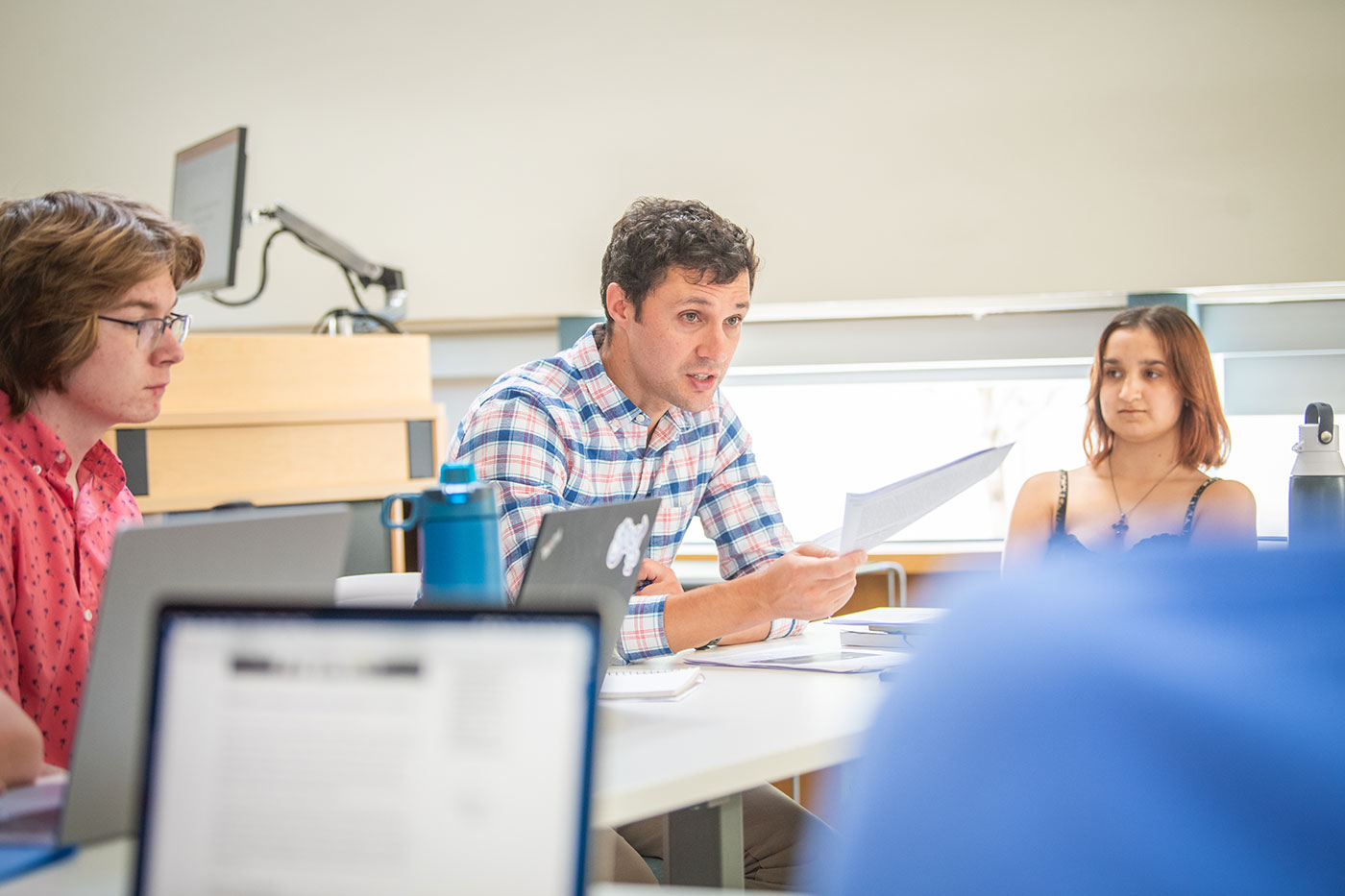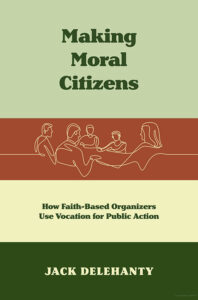Having faith to level the playing field

In classrooms at Clark University and other colleges, discussions about the role of religion in U.S. politics inevitably focus on conservative white Christians and their outsized influence on the Republican Party, elections, and the U.S. Supreme Court, according to Jack Delehanty, assistant professor of sociology.
But with his new book, “Making Moral Citizens: How Faith-Based Organizers Use Vocation for Public Action,” published by The University of North Carolina Press, Delehanty seeks to broaden that discussion, exploring how religion can empower people to fight for social justice.
Traditionally, in America’s individually focused society, people have been taught to look out for themselves and their families, he explains.
“The way you improve your life is by getting an education for yourself, by buying a home in a safer neighborhood, by getting a job that pays better,” Delehanty says. “These things appear to be within our control as individuals. But often if we peel back the layers, we don’t have as much control over those things as we might at first think, because there are structural factors that prevent people from being able to move into homes, get a better job, pay for college for their kids, or even pay for medical procedures.”
However, faith-based community organizations — which work for progressive causes by building common ground across racial, class, and religious lines — aim to transform their members into “moral citizens” that think and act collectively, according to Delehanty.
“Moral citizenship is about recognizing that the story we have often been told about how we can improve our lives needs some added complexity,” he explains, “and that there is a moral side to citizenship which involves recognizing that in order for me to get what matters to me and my family, I have to also empower others to be able to achieve that same thing.”
“Articulating a strong self-interest helps people develop a more lasting commitment to social justice struggles, but it also creates a platform of equality between people. Because it means that everybody has something on the line.”
Over three years, the sociologist researched a faith-based community organization in the Midwest that influenced political change — a group he calls ELIJAH. (Because of institutional research policies, he cannot identify the organization, the location, or the people involved.) He interviewed sources, analyzed documents, and observed and participated — a requirement set by ELIJAH’s leaders — by attending activities from small planning and strategy sessions to large rallies and “more contentious events, such as a dramatic disruption of the state chamber of commerce’s annual breakfast with legislators and a confrontational occupation of a payday lending store,” he writes.
Across the U.S., there are more than 220 faith-based community organizations, representing over 5 million people, that for the last four decades have focused on issues like affordable housing, police reform, voting rights, universal healthcare, and fully funded childcare.
To transform people into moral citizens, leaders in ELIJAH meet with members individually, appealing to their self-interest. The leaders encourage them to explore what Delehanty calls their “moral vocation,” or “ambition to enact a morally worthy self amid a chaotic social world,” he writes. “It is not just a sense of what is good but an ongoing, evolving life project that relies on probing reflection and interpersonal conversation to develop a sense of what a person cares about and how they can achieve it.”
Through ELIJAH’s training — which involves one-on-one meetings and pointed questions — Delehanty came to better understand his self-interest. “Articulating a strong self-interest helps people develop a more lasting commitment to social justice struggles, but it also creates a platform of equality between people. Because it means that everybody has something on the line,” he says. “I was able to see that a lot of things that I care about and that I want to achieve for me and my family, I can’t achieve by myself.”
Once that link between “moral vocation” and “moral citizenship” occurs, a powerful social and political movement can unfold. Delehanty describes how ELIJAH brought together 2,000 people from 171 different religious congregations in the wake of Donald Trump’s election to determine ways to counteract his rhetoric and policies.
 Like ELIJAH’s meetings and rallies, Delehanty’s book is filled with the stories of people from all walks of life who share, he writes, “how the sources of shame, pain, fear, and guilt in their lives reflect structural problems that transcend any one person’s situation.” Instead of “policy analysis or even theological discussion,” ELIJAH employs storytelling and similar relational practices to “construct empathy across difference,” he explains.
Like ELIJAH’s meetings and rallies, Delehanty’s book is filled with the stories of people from all walks of life who share, he writes, “how the sources of shame, pain, fear, and guilt in their lives reflect structural problems that transcend any one person’s situation.” Instead of “policy analysis or even theological discussion,” ELIJAH employs storytelling and similar relational practices to “construct empathy across difference,” he explains.
“Faith-based community organizing tries to draw attention to the idea that the playing field hasn’t always been level,” Delehanty says. “There are people who are really good at being participants in our democracy, and they are often active in chambers of commerce or political parties, and then there are people who have equal stake in our democracy but who don’t think of themselves as participants because they’re concerned about where the next rent check is going to come from.”
With a decline in religious attendance by Americans, especially Generation Z, Delehanty recognizes that “there is a sort of a limitation of the faith-based community organizing model. But there’s potential for this model to work in other spaces, too.”
The issues that young progressives care about — climate change, student debt relief, socioeconomic equality, and racial justice — lack a “unifying moral thread that can be pulled across all of them to say, ‘This is what we want our society to look like, this is the right way that things should be, and this is the moral case we can make for that,’ ” he suggests.
Any future unifying moral message by progressives “likely will draw on some ideas about social justice that have roots in religious traditions,” Delehanty says. “The Civil Rights Movement, the gay rights movement, the feminist movement — all leftist causes — have strong religious voices at their core. Religion is going to continue to matter in politics.”


